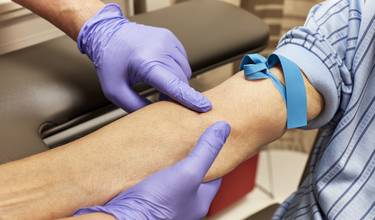Chest pain and cardiovascular disease
Cardiovascular disease is a serious condition, brought on by a build-up of fatty plaques, cholesterols and other substances in the blood vessels of the heart, i.e. the coronary arteries. When these are narrowed by fat and calcium blood flow to the muscles of the hearth is reduced and the available oxygen is not sufficient to meet its requirements. This leads to angina pectoris, that is severe tightening pain behind the sternum. Usually, the condition will develop over time, where the angina pectoris is only noticeable during strenuous physical activity - during which the muscles of the heart are more active and require more oxygen. Later, when the condition has been exacerbated because of additional build-up of fat or a blood clot, the patient will experience pain even while performing light physical activity or at rest. Around a fourth of all deaths in the UK are caused by cardiovascular diseases, of which narrowing of the coronary arteries is the most common ailment.
New device detects cardiovascular disease in the early stages
A recent study has developed a clinical blood sample test, capable of assessing the patient’s risk of developing a clinically significant heart attack or death from heath failure. The test can, within a mere two hours, produce the result of the blood sample and assess whether the patient is at high risk of developing cardiovascular disease. This can aide the physician in choosing the best course of treatment; lowering the risk of disease and the mortality rate. The device is called ‘HART TM CAD’ and has been tested in clinical trials. 900 patients participated in the trials. The participants were tested to see whether their coronary arteries were more than 70 % congested, which was the trial’s limit for whether patients required treatment. The test analysed the blood for certain biomarkers; including midkine, adiponectin, apo C-1, and KIM-1. A positive result from HART TM CAD indicated cardiovascular disease and an analysis of the device’s specificity showed that the results were correct in 90 % of the cases.
Current examination methods for patients with cardiovascular disease
Current examinations for cardiovascular disease include: stress-tests, coronary angiography, ECG, and image diagnostic examinations. However, these methods are either unreliable, expensive, or involve significant risks. The new test, which is cheaper and non-invasive, is therefore an excellent addition to the physicians’ options when diagnosing patients with suspected cardiovascular diseases. With new and improved diagnostic tools the researchers hope that an earlier diagnosis can result in pre-emptive treatment and lifestyle changes. Hopefully, can these changes prevent angina pectoris and complications, such as heart failure. The testing device will now be examined by the FDA and if the same promising results can be replicated, HART TM CAD will be available on the market, improving the quality of life for a large part of the population and, hopefully, save many human lives.
References:








